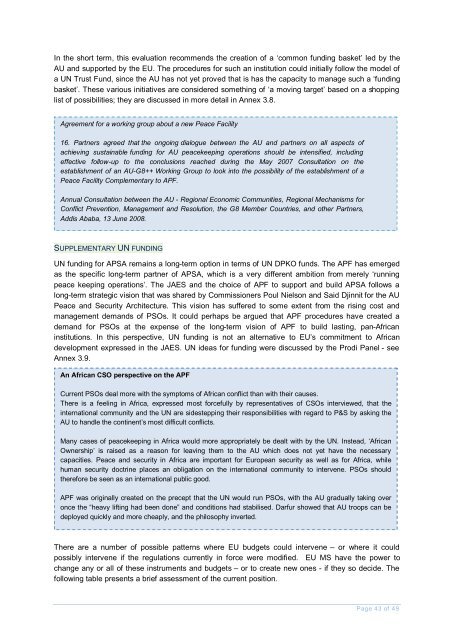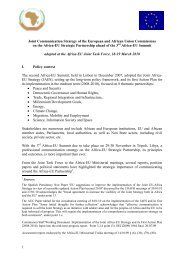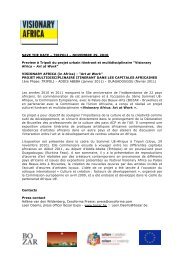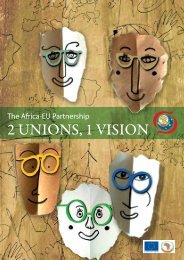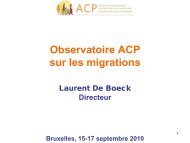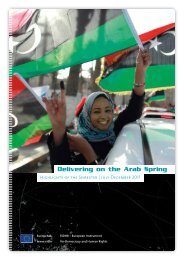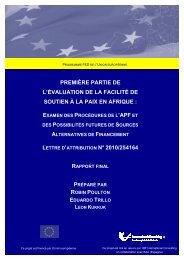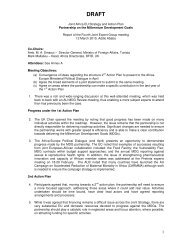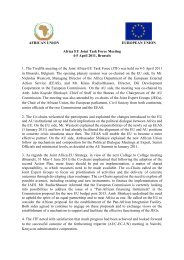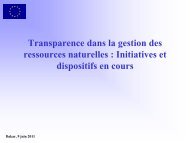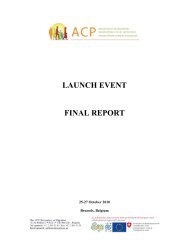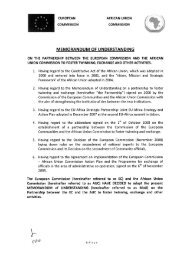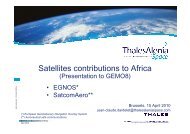part 1 of the african peace facility evaluation - European ...
part 1 of the african peace facility evaluation - European ...
part 1 of the african peace facility evaluation - European ...
Create successful ePaper yourself
Turn your PDF publications into a flip-book with our unique Google optimized e-Paper software.
In <strong>the</strong> short term, this <strong>evaluation</strong> recommends <strong>the</strong> creation <strong>of</strong> a ‘common funding basket’ led by <strong>the</strong><br />
AU and supported by <strong>the</strong> EU. The procedures for such an institution could initially follow <strong>the</strong> model <strong>of</strong><br />
a UN Trust Fund, since <strong>the</strong> AU has not yet proved that is has <strong>the</strong> capacity to manage such a ‘funding<br />
basket’. These various initiatives are considered something <strong>of</strong> ‘a moving target’ based on a shopping<br />
list <strong>of</strong> possibilities; <strong>the</strong>y are discussed in more detail in Annex 3.8.<br />
Agreement for a working group about a new Peace Facility<br />
16. Partners agreed that <strong>the</strong> ongoing dialogue between <strong>the</strong> AU and <strong>part</strong>ners on all aspects <strong>of</strong><br />
achieving sustainable funding for AU <strong>peace</strong>keeping operations should be intensified, including<br />
effective follow-up to <strong>the</strong> conclusions reached during <strong>the</strong> May 2007 Consultation on <strong>the</strong><br />
establishment <strong>of</strong> an AU-G8++ Working Group to look into <strong>the</strong> possibility <strong>of</strong> <strong>the</strong> establishment <strong>of</strong> a<br />
Peace Facility Complementary to APF.<br />
Annual Consultation between <strong>the</strong> AU - Regional Economic Communities, Regional Mechanisms for<br />
Conflict Prevention, Management and Resolution, <strong>the</strong> G8 Member Countries, and o<strong>the</strong>r Partners,<br />
Addis Ababa, 13 June 2008.<br />
SUPPLEMENTARY UN FUNDING<br />
UN funding for APSA remains a long-term option in terms <strong>of</strong> UN DPKO funds. The APF has emerged<br />
as <strong>the</strong> specific long-term <strong>part</strong>ner <strong>of</strong> APSA, which is a very different ambition from merely ‘running<br />
<strong>peace</strong> keeping operations’. The JAES and <strong>the</strong> choice <strong>of</strong> APF to support and build APSA follows a<br />
long-term strategic vision that was shared by Commissioners Poul Nielson and Said Djinnit for <strong>the</strong> AU<br />
Peace and Security Architecture. This vision has suffered to some extent from <strong>the</strong> rising cost and<br />
management demands <strong>of</strong> PSOs. It could perhaps be argued that APF procedures have created a<br />
demand for PSOs at <strong>the</strong> expense <strong>of</strong> <strong>the</strong> long-term vision <strong>of</strong> APF to build lasting, pan-African<br />
institutions. In this perspective, UN funding is not an alternative to EU’s commitment to African<br />
development expressed in <strong>the</strong> JAES. UN ideas for funding were discussed by <strong>the</strong> Prodi Panel - see<br />
Annex 3.9.<br />
An African CSO perspective on <strong>the</strong> APF<br />
Current PSOs deal more with <strong>the</strong> symptoms <strong>of</strong> African conflict than with <strong>the</strong>ir causes.<br />
There is a feeling in Africa, expressed most forcefully by representatives <strong>of</strong> CSOs interviewed, that <strong>the</strong><br />
international community and <strong>the</strong> UN are sidestepping <strong>the</strong>ir responsibilities with regard to P&S by asking <strong>the</strong><br />
AU to handle <strong>the</strong> continent’s most difficult conflicts.<br />
Many cases <strong>of</strong> <strong>peace</strong>keeping in Africa would more appropriately be dealt with by <strong>the</strong> UN. Instead, ‘African<br />
Ownership’ is raised as a reason for leaving <strong>the</strong>m to <strong>the</strong> AU which does not yet have <strong>the</strong> necessary<br />
capacities. Peace and security in Africa are important for <strong>European</strong> security as well as for Africa, while<br />
human security doctrine places an obligation on <strong>the</strong> international community to intervene. PSOs should<br />
<strong>the</strong>refore be seen as an international public good.<br />
APF was originally created on <strong>the</strong> precept that <strong>the</strong> UN would run PSOs, with <strong>the</strong> AU gradually taking over<br />
once <strong>the</strong> “heavy lifting had been done” and conditions had stabilised. Darfur showed that AU troops can be<br />
deployed quickly and more cheaply, and <strong>the</strong> philosophy inverted.<br />
There are a number <strong>of</strong> possible patterns where EU budgets could intervene – or where it could<br />
possibly intervene if <strong>the</strong> regulations currently in force were modified. EU MS have <strong>the</strong> power to<br />
change any or all <strong>of</strong> <strong>the</strong>se instruments and budgets – or to create new ones - if <strong>the</strong>y so decide. The<br />
following table presents a brief assessment <strong>of</strong> <strong>the</strong> current position.<br />
Page 43 <strong>of</strong> 49


